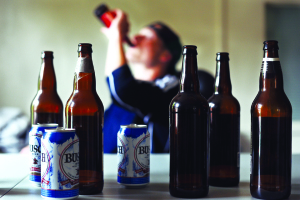 Denial of alcoholism is not a biochemical condition, but rather a psychological condition. It is, however, a very common aspect of alcohol addiction. A large majority of people who have struggled with alcohol addiction recall being in a state of denial. This condition involves telling yourself that you are not an alcoholic when, in fact, you are. The reason a person would do this is fairly self-explanatory with any understanding of addiction. All forms of addiction are detrimental to the addict, so much so that the destruction becomes apparent to other people. Even the addict is beginning to understand the consequences of their addictive behavior. However, at this point, they love the object of their addiction and are willing to invest much of themselves into protecting it. One method of ensuring their loyalty to the addiction is denial.
Denial of alcoholism is not a biochemical condition, but rather a psychological condition. It is, however, a very common aspect of alcohol addiction. A large majority of people who have struggled with alcohol addiction recall being in a state of denial. This condition involves telling yourself that you are not an alcoholic when, in fact, you are. The reason a person would do this is fairly self-explanatory with any understanding of addiction. All forms of addiction are detrimental to the addict, so much so that the destruction becomes apparent to other people. Even the addict is beginning to understand the consequences of their addictive behavior. However, at this point, they love the object of their addiction and are willing to invest much of themselves into protecting it. One method of ensuring their loyalty to the addiction is denial.
If someone is able to convince themselves that their addiction is not hurting them or anyone else, they can feel free to continue their addictive behavior. This is a very attractive option for some addicts, and it is a choice that is highly misunderstood. Those who do not understand addiction or resent it due to bad personal experiences with it tend to view denial as pure selfishness. True denial of alcoholism can be compared to denial of having cancer. It stems from fear. An alcoholic is deeply frightened of the thought of having to cope with the world sober in a similar way as a person might be afraid to cope with the world unhealthy. They are also afraid of the fierce withdrawal symptoms they will be met with if they separate from alcohol. This is the nature of addiction. Addicts are afraid of what will happen to them if they stop serving their addiction.
Denial of alcoholism is a serious psychological condition and often requires the services of a professional interventionist in order to break. If you need help breaking someone’s denial of their alcoholism, reach out to the alcohol addiction treatment network in your area.